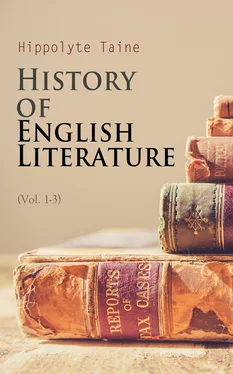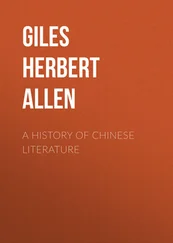Hippolyte Taine - History of English Literature (Vol. 1-3)
Здесь есть возможность читать онлайн «Hippolyte Taine - History of English Literature (Vol. 1-3)» — ознакомительный отрывок электронной книги совершенно бесплатно, а после прочтения отрывка купить полную версию. В некоторых случаях можно слушать аудио, скачать через торрент в формате fb2 и присутствует краткое содержание. Жанр: unrecognised, на английском языке. Описание произведения, (предисловие) а так же отзывы посетителей доступны на портале библиотеки ЛибКат.
- Название:History of English Literature (Vol. 1-3)
- Автор:
- Жанр:
- Год:неизвестен
- ISBN:нет данных
- Рейтинг книги:3 / 5. Голосов: 1
-
Избранное:Добавить в избранное
- Отзывы:
-
Ваша оценка:
- 60
- 1
- 2
- 3
- 4
- 5
History of English Literature (Vol. 1-3): краткое содержание, описание и аннотация
Предлагаем к чтению аннотацию, описание, краткое содержание или предисловие (зависит от того, что написал сам автор книги «History of English Literature (Vol. 1-3)»). Если вы не нашли необходимую информацию о книге — напишите в комментариях, мы постараемся отыскать её.
History of English Literature (Vol. 1-3) — читать онлайн ознакомительный отрывок
Ниже представлен текст книги, разбитый по страницам. Система сохранения места последней прочитанной страницы, позволяет с удобством читать онлайн бесплатно книгу «History of English Literature (Vol. 1-3)», без необходимости каждый раз заново искать на чём Вы остановились. Поставьте закладку, и сможете в любой момент перейти на страницу, на которой закончили чтение.
Интервал:
Закладка:
Again, behind a tragedy of the seventeenth century there is a poet, one, for example, like Racine, refined, discreet, a courtier, a fine talker, with majestic perruque and ribboned shoes, a monarchist and zealous Christian, "God having given him the grace not to blush in any society on account of zeal for his king or for the Gospel," clever in interesting the monarch, translating into proper French "the gaulois of Amyot," deferential to the great, always knowing how to keep his place in their company, assiduous and respectful at Marly as at Versailles, amid the formal creations of a decorative landscape and the reverential bows, graces, intrigues, and finesses of the braided seigniors who get up early every morning to obtain the reversion of an office, together with the charming ladies who count on their fingers the pedigrees which entitle them to a seat on a footstool. On this point consult Saint-Simon and the engravings of Pérelle, the same as you have just consulted Balzac and the water-color drawings of Eugène Lami.
In like manner, on reading a Greek tragedy, our first care is to figure to ourselves the Greeks, that is to say, men who lived half-naked in the gymnasiums or on a public square under a brilliant sky, in full view of the noblest and most delicate landscape, busy in rendering their bodies strong and agile, in conversing together, in arguing, in voting, in carrying out patriotic piracies, and yet idle and temperate, the furniture of their houses consisting of three earthen jars and their food of two pots of anchovies preserved in oil, served by slaves who afford them the time to cultivate their minds and to exercise their limbs, with no other concern than that of having the most beautiful city, the most beautiful processions, the most beautiful ideas, and the most beautiful men. In this respect, a statue like the "Meleager" or the "Theseus" of the Parthenon, or again a sight of the blue and lustrous Mediterranean, resembling a silken tunic out of which islands arise like marble bodies, together with a dozen choice phrases selected from the works of Plato and Aristophanes, teach us more than any number of dissertations and commentaries.
And so again, in order to understand an Indian Purana, one must begin by imagining the father of a family who, "having seen a son on his son's knees," follows the law and, with axe and pitcher, seeks solitude under a banyan trees, talks no more, multiplies his fastings, lives naked with four fires around him under the fifth fire, that terrible sun which endlessly devours and resuscitates all living things; who fixes his imagination in turn for weeks at a time on the foot of Brahma, then on his knee, on his thigh, on his navel, and so on, until, beneath the strain of this intense meditation, hallucinations appear, when all the forms of being, mingling together and transformed into each other, oscillate to and fro in this vertiginous brain until the motionless man, with suspended breath and fixed eyeballs, beholds the universe melting away like vapor over the vacant immensity of the Being in which he hopes for absorption. In this case the best of teachings would be a journey in India; but, for lack of a better one, take the narratives of travellers along with works in geography, botany, and ethnology. In any event, there must be the same research. A language, a law, a creed, is never other than an abstraction; the perfect thing is found in the active man, the visible corporeal figure which eats, walks, fights, and labors. Set aside the theories of constitutions and their results, of religions and their systems, and try to observe men in their workshops or offices, in their fields along with their own sky and soil, with their own homes, clothes, occupations and repasts, just as you see them when, on landing in England or in Italy, you remark their features and gestures, their roads and their inns, the citizen on his promenades and the workman taking a drink. Let us strive as much as possible to supply the place of the actual, personal, sensible observation that is no longer practicable, this being the only way in which we can really know the man; let us make the past present; to judge of an object it must be present; no experience can be had of what is absent. Undoubtedly, this sort of reconstruction is always imperfect; only an imperfect judgment can be based on it; but let us do the best we can; incomplete knowledge is better than none at all, or than knowledge which is erroneous, and there is no other way of obtaining knowledge approximatively of bygone times than by seeing approximatively the men of former times.
Such is the first step in history. This, step was taken in Europe at the end of the last century when the imagination took fresh flight under the auspices of Lessing and Walter Scott, and a little later in France under Chateaubriand, Augustin Thierry, Michelet, and others. We now come to the second step.
II. The outer man is only a clue to study the inner invisible man
Table of Contents
On observing the visible man with your own eyes what do you try to find in him? The invisible man. These words which your ears catch, those gestures, those airs of the head, his attire and sensible operations of all kinds, are, for you, merely so many expressions; these express something, a soul. An inward man is hidden beneath the outward man, and the latter simply manifests the former. You have observed the house in which he lives, his furniture, his costume, in order to discover his habits and tastes, the degree of his refinement or rusticity, his extravagance or economy, his follies or his cleverness. You have listened to his conversation and noted the inflections of his voice, the attitudes he has assumed, so as to judge of his spirit, self-abandonment or gayety, his energy or his rigidity. You consider his writings, works of art, financial and political schemes, with a view to measure the reach and limits of his intelligence, his creative power and self-command, to ascertain the usual order, kind, and force of his conceptions, in what way he thinks and how he resolves. All these externals are so many avenues converging to one centre, and you follow these only to reach that centre; here is the real man, namely, that group of faculties and of sentiments which produces the rest. Behold a new world, an infinite world; for each visible action involves an infinite train of reasonings and emotions, new or old sensations which have combined to bring this into light and which, like long ledges of rock sunk deep in the earth, have cropped out above the surface and attained their level. It is this subterranean world which forms the second aim, the special object of the historian. If his critical education suffices, he is able to discriminate under every ornament in architecture, under every stroke of the brush in a picture, under each phrase of literary composition, the particular sentiment out of which the ornament, the stroke, and the phrase have sprung; he is a spectator of the inward drama which has developed itself in the breast of the artist or writer; the choice of words, the length or shortness of the period, the species of metaphor, the accent of a verse, the chain of reasoning—all are to him an indication; while his eyes are reading the text his mind and soul are following the steady flow and ever-changing series of emotions and conceptions from which this text has issued; he is working out its psychology. Should you desire to study this operation, regard the promoter and model of all the high culture of the epoch, Goethe, who, before composing his "Iphigenia" spent days in making drawings of the most perfect statues and who, at last, his eyes filled with the noble forms of antique scenery and his mind penetrated by the harmonious beauty of antique life, succeeded in reproducing internally, with such exactness, the habits and yearnings of Greek imagination as to provide us with an almost twin sister of the "Antigone" of Sophocles and of the goddesses of Phidias. This exact and demonstrated divination of bygone sentiments has, in our days, given a new life to history. There was almost complete ignorance of this in the last century; men of every race and of every epoch were represented as about alike, the Greek, the barbarian, the Hindoo, the man of the Renaissance and the man of the eighteenth century, cast in the same mold and after the same pattern, and after a certain abstract conception which served for the whole human species. There was a knowledge of man but not of men. There was no penetration into the soul itself; nothing of the infinite diversity and wonderful complexity of souls had been detected; it was not known that the moral organization of a people or of an age is as special and distinct as the physical structure of a family of plants or of an order of animals. History to-day, like zoölogy, has found its anatomy, and whatever branch of it is studied, whether philology, languages or mythologies, it is in this way that labor must be given to make it produce new fruit. Among so many writers who, since Herder, Ottfried Müller, and Goethe have steadily followed and rectified this great effort, let the reader take two historians and two works, one "The Life and Letters of Cromwell" by Carlyle, and the other the "Port Royal" of Sainte-Beuve. He will see how precisely, how clearly, and how profoundly we detect the soul of a man beneath his actions and works; how, under an old general and in place of an ambitious man vulgarly hypocritical, we find one tormented by the disordered reveries of a gloomy imagination, but practical in instinct and faculties, thoroughly English and strange and incomprehensible to whoever has not studied the climate and the race; how, with about a hundred scattered letters and a dozen or more mutilated speeches, we follow him from his farm and his team to his general's tent and to his Protector's throne, in his transformation and in his development, in his struggles of conscience and in his statesman's resolutions, in such a way that the mechanism of his thought and action becomes visible and the ever renewed and fitful tragedy, within which racked this great gloomy soul, passes like the tragedies of Shakespeare into the souls of those who behold them. We see how, behind convent disputes and the obstinacy of nuns, we recover one of the great provinces of human psychology; how fifty or more characters, rendered invisible through the uniformity of a narration careful of the properties, come forth in full daylight, each standing out clear in its countless diversities; how, underneath theological dissertations and monotonous sermons, we discern the throbbings of ever-breathing hearts, the excitements and depressions of the religious life, the unforeseen reaction and pell-mell stir of natural feeling, the infiltrations of surrounding society, the intermittent triumphs of grace, presenting so many shades of difference that the fullest description and most flexible style can scarcely garner in the vast harvest which the critic has caused to germinate in this abandoned field. And the same elsewhere. Germany, with its genius, so pliant, so broad, so prompt in transformations, so fitted for the reproduction of the remotest and strangest states of human thought; England, with its matter-of-fact mind, so suited to the grappling with moral problems, to making them clear by figures, weights, and measures, by geography and statistics, by texts and common sense; France, at length, with its Parisian culture and drawing-room habits, with its unceasing analysis of characters and of works, with its ever ready irony at detecting weaknesses, with its skilled finesse in discriminating shades of thought—all have ploughed over the same ground, and we now begin to comprehend that no region of history exists in which this deep sub-soil should not be reached if we would secure adequate crops between the furrows.
Читать дальшеИнтервал:
Закладка:
Похожие книги на «History of English Literature (Vol. 1-3)»
Представляем Вашему вниманию похожие книги на «History of English Literature (Vol. 1-3)» списком для выбора. Мы отобрали схожую по названию и смыслу литературу в надежде предоставить читателям больше вариантов отыскать новые, интересные, ещё непрочитанные произведения.
Обсуждение, отзывы о книге «History of English Literature (Vol. 1-3)» и просто собственные мнения читателей. Оставьте ваши комментарии, напишите, что Вы думаете о произведении, его смысле или главных героях. Укажите что конкретно понравилось, а что нет, и почему Вы так считаете.












